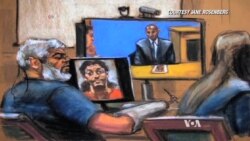NEW YORK —
A federal jury in New York has convicted former London-based radical Islamic preacher Abu Hamza on all 11 counts of providing material support to terrorists.
The guilty verdict for Abu Hamza, whose birth name is Mustafa Kamel Mustafa, followed a month-long trial before a jury of eight men and four women. They found Hamza guilty on all 11 terrorism-related counts, including sending two followers to set up a jihad training camp in the U.S., dispatching two men to help al-Qaida in Afghanistan, and providing hostage-takers in Yemen with a satellite phone.
Four European hostages died during a rescue attempt. Two survivors testified at the trial, as did a convicted former al-Qaida associate who appeared from Britain via a live television feed. Jurors also saw videotapes and heard audio clips of Hamza in which he called non-Muslims “pigs” and justified taking them captive.
The Egyptian-born Hamza was extradited from Britain after serving a seven-year sentence there for inciting murder and racial hatred. He took the stand to testify in his own defense, denied having aided jihadists, and said he previously apologized for his extremist sermons. He choked up while describing the 1995 massacre of Muslims in Bosnia. He said he had not known about the Yemeni hostage-taking plan and urged the kidnappers to end the operation when he spoke to them on the phone.
Karen Greenberg, director of Fordham University’s Center on National Security, said during the trial that Hamza appeared thoughtful, even “scholarly.”
“He has not used this as a pulpit for proselytizing about jihad. Quite the opposite. Whenever he has been given the chance, he has backed away from the idea of violence and talked a great deal about religion in a more helpful sense," said Greenberg.
But in closing arguments, prosecutors urged jurors not to be “fooled” by Hamza’s testimony, saying he was trying to “sell” a version of himself that contradicted the evidence that he was a leader dedicated to violent jihad.
Defense attorney Jeremy Schneider countered that the evidence against Hamza amounted only to words, not actual deeds.
Hamza faces possible life in prison when he is sentenced later this year.
This report is based on news agency reports.
The guilty verdict for Abu Hamza, whose birth name is Mustafa Kamel Mustafa, followed a month-long trial before a jury of eight men and four women. They found Hamza guilty on all 11 terrorism-related counts, including sending two followers to set up a jihad training camp in the U.S., dispatching two men to help al-Qaida in Afghanistan, and providing hostage-takers in Yemen with a satellite phone.
Four European hostages died during a rescue attempt. Two survivors testified at the trial, as did a convicted former al-Qaida associate who appeared from Britain via a live television feed. Jurors also saw videotapes and heard audio clips of Hamza in which he called non-Muslims “pigs” and justified taking them captive.
The Egyptian-born Hamza was extradited from Britain after serving a seven-year sentence there for inciting murder and racial hatred. He took the stand to testify in his own defense, denied having aided jihadists, and said he previously apologized for his extremist sermons. He choked up while describing the 1995 massacre of Muslims in Bosnia. He said he had not known about the Yemeni hostage-taking plan and urged the kidnappers to end the operation when he spoke to them on the phone.
Karen Greenberg, director of Fordham University’s Center on National Security, said during the trial that Hamza appeared thoughtful, even “scholarly.”
“He has not used this as a pulpit for proselytizing about jihad. Quite the opposite. Whenever he has been given the chance, he has backed away from the idea of violence and talked a great deal about religion in a more helpful sense," said Greenberg.
But in closing arguments, prosecutors urged jurors not to be “fooled” by Hamza’s testimony, saying he was trying to “sell” a version of himself that contradicted the evidence that he was a leader dedicated to violent jihad.
Defense attorney Jeremy Schneider countered that the evidence against Hamza amounted only to words, not actual deeds.
Hamza faces possible life in prison when he is sentenced later this year.
This report is based on news agency reports.







